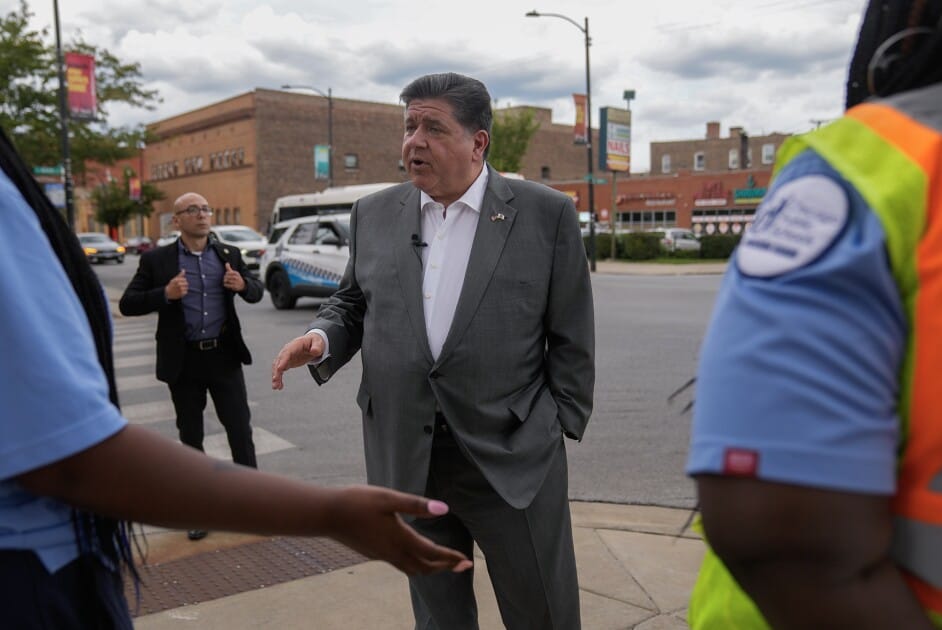Illinois lawmakers passed a new law that codifies the right of undocumented students to receive a free, public education, and requires school districts to adopt clear policies protecting students from immigration enforcement activities in schools.
House Bill 3247—signed into law by Democratic Gov. JB Pritzker on Aug. 15—is the state’s response to rising fear among local immigrant communities over the Trump administration’s push for increased immigration enforcement across the country, lawmakers and advocates said.
The law is also a response to the efforts of policymakers in other states to overturn the 1982 U.S. Supreme Court decision in Plyler v. Doe, which granted a constitutional right to a free, public education to all students regardless of immigration status. Since President Donald Trump’s re-election, policymakers in at least six states have taken actions to challenge Plyler, with at least one of these still in process, and the rest paused or defeated, according to an Education Week analysis.
State Rep. Lilian Jiménez, a Democrat who sponsored the Illinois bill, said the new law—set to take effect in January—ensures all schools in the state comply with the Plyler decision, and goes further by requiring schools to implement policies that would limit immigration officers’ access to schools.
“We just don’t want there to be any room for school districts to go rogue and decide that they don’t want to follow Plyler,” Jiménez said.
New law addresses immigration enforcement at schools
Jiménez said school districts with large immigrant populations in the state reported an increase in absenteeism following the Trump administration’s rescission of a longstanding “sensitive locations” policy in January. The internal policy limited immigration enforcement, such as arrests and interrogations, at school sites.
Though Jiménez was born in the United States and grew up in Chicago, her mother remained undocumented for most of her life. That reality, she said, left her fearful of what might happen if her mother were ever detained—a fear she said she’s been hearing from families across Illinois amid high-profile immigration enforcement activities nationally.
It’s why the new state law she sponsored requires school districts to adopt policies under which they cannot “allow an immigration agent to enter a school site or school district facility for any purpose without providing valid identification, a written statement of purpose, and a valid judicial warrant, and, to the extent possible, receiving approval from the superintendent of the school district or the principal of the charter school, and their legal counsel.”
The law also prohibits districts and schools from detaining any individual “solely on the basis of any formal or informal request, or immigration detainer or civil immigration warrant from an immigration agent.”
Illinois is not alone.
Since 2018, California’s Assembly Bill 699 has similarly required school districts to adopt policies limiting cooperation with immigration enforcement. And in December 2024, in response to the then-incoming Trump administration’s stated goals of increased immigration enforcement, California Attorney General Rob Bonta issued updated guidance for public institutions on limiting such cooperation with immigration officers, including K-12 schools.
State leaders in Illinois will now work to provide model policies for school districts in the coming months to help ensure compliance with the new state law when it takes effect.
Uniformity is one objective of the new state law
Though some school districts in the state may already have policies or protocols in place that address immigration enforcement at schools, the new law helps create some uniformity in ensuring all students are protected, regardless of where they enroll, said Hector Villagra, the vice president of policy advocacy and community education at the Mexican American Legal Defense and Educational Fund, or MALDEF. The legal organization supported the Illinois bill and litigated the original Plyler v. Doe case.
In 2024, the Heritage Foundation, the conservative think tank behind the Project 2025 policy playbook that is driving much of Trump’s agenda, published a brief recommending that states pass legislation that would trigger legal action to bring the 1982 decision back before the Supreme Court.
Such public conversation of the law is part of why MALDEF advocates for codifying Plyler in more states.
“What this law says is that you can’t deny equal access,” Villagra said. “You also can’t do anything that will discourage kids from enrolling or attending.”
“I do think that we will be looking for other states where we can make a similar mark in state law and enshrine this very important principle and leave no doubt about what it means in terms of things like allowing access for law enforcement on a campus,” he added.
Jiménez, an attorney who practices immigration law and formerly worked with MALDEF, said in years prior she had seen cases of smaller school districts violating Plyler‘s requirements due to misunderstandings and misinterpretations.
The new state law codifying Plyler locally helps remove any confusion and offers Illinois a local buffer in the event of shifting federal law, she said.
In July, the Trump administration announced the intent to prohibit undocumented families from accessing federal programs such as Head Start, the preschool program for children from families living in poverty, in part by limiting what counts as basic education covered by Plyler.
“There are some forces trying to overturn Plyler. If it were to go in that route, we would be on safer ground here in Illinois,” Jiménez said.
2025-08-28 20:20:30
Source link

